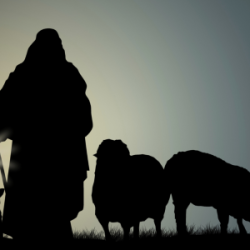Lectionary Reflections
Isaiah 7:10-16
December 22, 2013
Fourth Sunday of Advent
You know it must be the fourth Sunday in Advent when the famous words of Isaiah 7 are sounded again in the church. The choir's lead alto warms her plumiest toned voice, the organist practices his finest fingered triplets, and Handel's recitative, "Behold, A Virgin Shall Conceive" resounds through the quiet sanctuary. "Behold, a virgin shall conceive, and bear a son, and shall call his name Emmanuel—God with us" translates the KJV, and sets off a four-hundred-year fight about the necessity—or not—of believing that Jesus was in fact born of a virgin. The fight intensified, since Matthew quoted these verses in his 1:23, and it became dogma that if a gospel writer said it, then I must believe it.
It has always struck me as decidedly peculiar that Isaiah 7:14 precipitated such a brouhaha. I assume you know by now that the translation from Hebrew to Greek caused some of the difficulty. I used to say, in my haughtier youth, that Hebrew 'almah meant only "young woman," while Greek parthenos could mean either "virgin" or "young woman." Hence, Matthew may or may not have been saying that Jesus' birth was virginal; he may only have been quoting Isaiah 7:14 to do what he always wished to do with his Bible quotations, namely, prove from Hebrew scripture that Jesus was who Matthew said he was, the Messiah of Israel.
In my now older increased scholarly humility—well, somewhat increased humility—I know that that entire linguistic discussion is rather more complex. 'almah could in fact mean virgin, though Hebrew does have another word that usually does mean that, bethulah. Thus, I do not any longer excoriate those who try to prove Jesus' miraculous birth simply by quoting these texts. What Isaiah "meant" and what Matthew "meant" may finally be beyond our ability to recover, given the two millennia and more that have passed since their writing.
In any case, it remains peculiar that the fight over virginity should have come from these tiny shards of text. In reality, in the context of the entire passage we read from Isaiah this day, the question of a miracle birth is not in the slightest an obvious one. All of Isaiah 7 has one thought in mind: Ahaz, king of Judah is worrying over nothing, and Isaiah attempts, in a rather convoluted prophetic way, to reassure his king that his worries are groundless. Why should we worry about things that are in the full purview of YHWH? Yet, Ahaz is worried, and Isaiah attempts to prove to him that his worry is in fact nothing less than atheism, nothing less than arrogance.
Here is the problem. The northern kingdom, Israel, ever anxious to recover the lost territory of the south, Judah—lost when the kingdoms divided after the death of Solomon in 922 B.C.E.—has made a pact with the kingdom of Aram to the east. The coalition was formed for one purpose, to recapture and presumably divide the kingdom of Judah between the two of them. It is hardly a fair fight. Israel is and has always been by far the stronger of the two tiny countries. It has all the good agricultural land, the bulk of the population, the better climate, more rainfall, etc. Judah has Jerusalem, the Dead Sea, and the vast, essentially uninhabitable, deserts of the south. In addition, the kingdom of Aram, with its capital city of Damascus, and its alliance with mighty Assyria, brings significant forces and economic support to the pact. In short, Judah is facing a hugely superior force, and thus Ahaz is rightly worried. This military story is made clear in Isaiah 7:4-6. There, the kings of Israel and Aram are hilariously called "two smoldering stumps of firebrands," that is their fire is low and gives off little heat! Rezin is king of Aram while Pekah, son of Remaliah, is king of Israel. "Take heed, be quiet, do not be afraid, do not let your heart faint," says YHWH through Isaiah. The smoking stumps are about to flame out!
Ahaz remains fearful. So Isaiah tries another tack. "Ask a sign of YHWH your God; let it be deep as Sheol or high as heaven" (Is. 7:11). In other words, rather than trust only my words, says Isaiah, talk to God directly; ask YHWH for some proof that your fears are baseless. The implication is that Ahaz is not regular in his contact with YHWH! And the king replies, "I will not ask; I will not put YHWH to the test" (Is. 7:12). One can easily hear the tone of that response. With an unctuous and plainly false piety, Ahaz says, "Oh, Isaiah! Far be it from me, pathetic mortal that I am, to ask of my God anything, let alone quizzing him about my fate!" Actually what the king means is that he is so little used to asking God anything at all that he is fearful that YHWH will say nothing to him by way of response.
Isaiah sees right through the king's phony piety and shouts, "Listen then, O House of David! Is it too small a thing that you tire mortals that you must tire my God, too?" (Is. 7:13). Ahaz, you are wasting everyone's time and energy with your tiresome and false pretensions, including YHWH's. So, listen up! "Therefore, The Lord God will give you (pl) a sign: Look! An 'almah will conceive and bear a son, and she will call him Emmanuel" (Is. 7:14). The next two lines of the text are difficult, and have been given alternative translations. I think they may be read as follows: "Curds and honey he will eat until he knows how to reject evil and choose good. Surely, before the boy knows how to reject evil and choose good, the land before whose two kings you dread will be deserted" (Is. 7:15-16).





